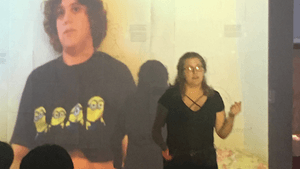Stay in the Loop
BSR publishes on a weekly schedule, with an email newsletter every Wednesday and Thursday morning. There’s no paywall, and subscribing is always free.
What's normal, anyway?
SoLow Fest presents Tenara Calem's 'Me, More Normal'

Writer/performer (and occasional BSR contributor) Tenara Calem remembers chaos breaking out when she was 17. Her family’s planned vacation accommodations changed from a relative’s home to an opulent hotel — something most people would enjoy. Unfortunately, it was a switch that transformed her family into “the unstable nucleus of a uranium bomb.”
As Calem explains in her one-woman show, Me, More Normal, directed by Krista Thorp and premiering at the Art Church of West Philadelphia as part of the 2017 SoLow Fest, her brother, two years younger, is gifted at drawing, memorization, and imitating funny character voices. He also has “an incredible knack for bringing into the room what is unsaid.” He also has autism, and because of our society’s rampant “capitalist-bullshit-whatever syndrome,” Tenara’s talents and skills are more valued by employers, friends, and the public.
“Discomfort everywhere”
In the fancy hotel, the unfamiliar stimuli of which trigger a meltdown for Calem's brother, the sudden change in accommodations becomes an insurmountable crisis. The family’s frustration almost tips into violence, and she vividly recalls pulling him into the enclosed space of the hotel-room shower, drawing the curtain, and trying to quiet him.
“We create discomfort everywhere,” she says. And her family has “a unique capacity to be impervious to luxury.” She begins to hate everything about her surroundings, “trying to find something to resent that makes the situation bite-sized.”
Her show pairs real-life storytelling and some readings from the audience with impressive, immersive digital projections by John Bezark, melding text and her brother's artwork with poignantly juxtaposed childhood videos, plus contemporary interview footage radiating the siblings’ love and unique rapport.
“This is normal, but there are times when you don’t like it,” text projected on the wall announces.
Compassion, at what cost?
Calem doesn’t always like it — she says that, as a young teen, she begged her father to leave her sibling out of a family vacation.
Her father broke down in tears, and Calem heard something from him that might torture her as much as the outside world’s disregard for her brother does. She learned the expectation that bearing with his difficulties would make her into a better person. But, through her own tears onstage, she explains the grief she feels when others hope she’ll gain “more compassion at the expense of watching [her brother] struggle.” It’s not a price Calem wants to pay for what others see as her virtues.
“A goddamn empty word”
Calem’s script conveys her distress with sharply hyperbolic language throughout, aptly articulating a problem that lies more with societal norms than with the challenges of any one individual.
Norms — now there’s a slippery word, especially for a loved one with autism.
Normal is “a goddamn empty word,” Calem insists, illustrating with a side trip through the annals of cultural relativism worldwide. For example, we think it’s polite to eat everything we’re served; if we can’t, it means we’re full. On the other side of the world, cleaning your plate is a blatant slight to your host, signifying that you weren’t served enough food.
Calem points to the inane circularity of the definition of normal in our most important psychiatric guidebook, the Diagnostic and Statistical Manual of Mental Disorders, fifth edition (DSM-5), which insists it’s necessary to define normality in order to identify suffering.
So what is abnormal behavior, according to the DSM-5? “Abnormal behavior is generally defined as behavior that violates a norm in society, is maladaptive, is rare given the context of the culture and environment, and is causing the person distress in their daily life.”
Calem zeroes in on that first part: how can we define abnormal as that which violates the “norm” when we can’t even define the norm? And how can we define it when people without mental and emotional characteristics like her brother’s are always in charge of deciding what the norm is?
See it in September
In truth, we’re blindly building a world where people like Calem (“person A”) succeed, and people like her younger brother (“person B”) are left behind. Me, More Normal is a gripping 45 minutes that spotlights Calem’s humor, grief, and anger. It asks everyone to consider their complicity in a world where a goofy, artistic, honest, loyal, and beloved member of the family wonders why no one wants to be his friend.
The artists of Me, More Normal want to continue the conversation, so with the help of the Arc of Philadelphia, they’re holding a July 22 workshop “about how to make your art and your artistic process more inclusive.” For more information, email [email protected].
Even though the SoLow Fest is over, you still have a chance to catch this show—it returns to the Art Church September 8 and 9, 2017, for the Philadelphia Fringe Festival.
What, When, Where
Me, More Normal. By Tenara Calem, Krista Thorp directed. June 23-25, 2017, at the Art Church of West Philadelphia, 5219 Webster Street, Philadelphia. Returning to the Philadelphia Fringe Festival September 8-9, 2017. solowfest.com and (215) 413-1318 or fringearts.com.
Sign up for our newsletter
All of the week's new articles, all in one place. Sign up for the free weekly BSR newsletters, and don't miss a conversation.

 Alaina Johns
Alaina Johns